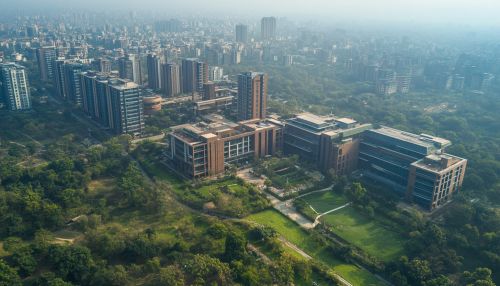Indian Institutes of Technology (IITs): Difference between revisions
(Created page with "== Overview == The Indian Institutes of Technology (IITs) are a group of autonomous public technical and research universities located across India. They are governed by the Institutes of Technology Act, 1961, which has declared them as institutions of national importance. The IITs are renowned for their high academic standards, rigorous selection process, and significant contributions to research and development in various fields of science, engineering, and technology...") |
No edit summary |
||
| Line 15: | Line 15: | ||
Research is a core component of the IITs' mission. Each IIT has specialized research centers and laboratories that focus on cutting-edge technologies and innovations. The institutes collaborate with industry partners, government agencies, and international organizations to drive research initiatives. Areas of research include [[nanotechnology]], [[artificial intelligence]], [[biotechnology]], and renewable energy, among others. | Research is a core component of the IITs' mission. Each IIT has specialized research centers and laboratories that focus on cutting-edge technologies and innovations. The institutes collaborate with industry partners, government agencies, and international organizations to drive research initiatives. Areas of research include [[nanotechnology]], [[artificial intelligence]], [[biotechnology]], and renewable energy, among others. | ||
[[Image:Detail-99883.jpg|thumb|center|Aerial view of an IIT campus with modern buildings and green spaces.|class=only_on_mobile]] | |||
[[Image:Detail-99884.jpg|thumb|center|Aerial view of an IIT campus with modern buildings and green spaces.|class=only_on_desktop]] | |||
== Faculty and Alumni == | == Faculty and Alumni == | ||
Latest revision as of 21:37, 2 November 2024
Overview
The Indian Institutes of Technology (IITs) are a group of autonomous public technical and research universities located across India. They are governed by the Institutes of Technology Act, 1961, which has declared them as institutions of national importance. The IITs are renowned for their high academic standards, rigorous selection process, and significant contributions to research and development in various fields of science, engineering, and technology.
History
The concept of establishing IITs in India was first proposed in the early 1940s by Sir Ardeshir Dalal, a member of the Viceroy's Executive Council. The idea gained momentum post-independence, with the first IIT being established in Kharagpur in 1951. The success of IIT Kharagpur led to the establishment of additional IITs in Bombay (1958), Madras (1959), Kanpur (1959), and Delhi (1961). Over the years, the network has expanded to include 23 IITs across India.
Academic Structure
The IITs offer undergraduate, postgraduate, and doctoral programs in various fields of engineering, technology, management, and sciences. The academic structure is designed to provide a strong foundation in theoretical knowledge while emphasizing practical applications and research. The JEE Advanced is the primary entrance test for undergraduate admissions, known for its challenging nature and competitive selection process.
Research and Development
Research is a core component of the IITs' mission. Each IIT has specialized research centers and laboratories that focus on cutting-edge technologies and innovations. The institutes collaborate with industry partners, government agencies, and international organizations to drive research initiatives. Areas of research include nanotechnology, artificial intelligence, biotechnology, and renewable energy, among others.


Faculty and Alumni
The faculty at IITs comprises distinguished scholars and researchers who contribute significantly to their fields. Many faculty members have received prestigious awards and fellowships. The alumni network of IITs is extensive and influential, with graduates holding prominent positions in academia, industry, and government worldwide. Notable alumni include Sundar Pichai, CEO of Google, and Arvind Krishna, CEO of IBM.
Campus Life
Campus life at IITs is vibrant and diverse, offering students numerous opportunities for personal and professional growth. The institutes host various cultural, technical, and sports festivals, fostering a sense of community and collaboration. Facilities include state-of-the-art libraries, laboratories, and recreational centers, ensuring a conducive environment for learning and innovation.
International Collaborations
IITs have established partnerships with leading universities and research institutions globally. These collaborations facilitate student and faculty exchanges, joint research projects, and academic programs. The IITs' international presence enhances their reputation and contributes to the global exchange of knowledge and technology.
Challenges and Future Prospects
Despite their success, IITs face challenges such as maintaining quality amidst expansion, ensuring diversity, and addressing funding constraints. The future prospects for IITs involve strengthening their research capabilities, enhancing global collaborations, and contributing to India's socio-economic development through innovation and entrepreneurship.
